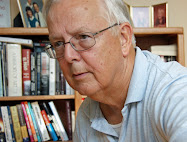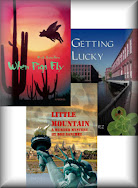This interview with Anne Hillerman, daughter of the late mystery writer Tony Hillerman, appeared in the May 2010 issue of Southwest Senior. Reprinted with permission.
You and your husband Don Strel have two new books out within six months of each other: Tony Hillerman’s Landscape last October and Gardens of Santa Fe this month. What were the challenges and the pleasures of these two projects?
Both books posed a similar challenge—how to condense the information and select among so many possible photos to give readers the best book possible. For Tony Hillerman's Landscape, photographer Don Strel and I both enjoyed traveling throughout the Four Corners area and the Navajo Nation, following the footsteps of Tony Hillerman's detectives, Jim Chee and Joe Leaphorn. In Gardens of Santa Fe, we delighted in the opportunity to see such gorgeous gardens and meet the interesting people who created them.

Tell us about the origins of Tony Hillerman’s Landscape.
Each fall, I help present the Tony Hillerman Writer's Conference: Focus on Mystery. One year New Mexico mystery author Michael McGarrity was our keynote speaker, and Don Strel created a slide show of the places in southern and southwestern New Mexico McGarrity used for his latest book. Tony was in the audience and enjoyed McGarrity's illustrated talk. Afterward he said to Don "Why don't you do something like that for my books?"
Which of your dad’s Chee/Leaphorn novels is your favorite, and why?
Working on our Hillerman's Landscape book gave me a great excuse to re-read them all and I found something I'd forgotten and admired in each of them. I especially enjoyed the early books, Dance Hall of the Dead, Listening Woman, The Dark Wind. I hadn't read them for 25-30 years and they hold up over time very well.
Why do you think readers connected so well with his work?
Tony Hillerman was a wonderful storyteller, with a tremendous appreciation for the landscape in which his stories are set and for the characters who inhabit them. The plot resolutions leave the readers satisfied. The bad guys get what they deserve, Leaphorn and/or Chee solve the crime—and teach us something about the Navajo in the process.
How have his novels affected popular perceptions of the Southwest?
As Don and I have traveled throughout Arizona, Utah, Colorado and New Mexico on our book tour, we met many people who say Dad's novels provided their introduction to the Southwest. They liked what they read, came here to visit, and maybe even moved here. The books present American Indians—Navajos, Hopis, Zunis, Utes and other tribes—as real people, and as different from each other. His skill here has helped educate readers who haven't had much other exposure to Southwestern Indians.
Did your dad model any of his characters on real people? And how much Tony Hillerman is in Joe Leaphorn's character?
Yes, Dad often mentioned that he built Joe Leaphorn in part on a sherriff he came to know when he worked a reporter in his early days on the police beat in rural Texas. Other characters, including one memorable villain who spends his spare time trying to find the mother who abandoned him, came from his years in journalism. Sometimes, Dad would let non-profit groups auction off the chance to have a character in his next book named after the buyer. But, although the names are real those character don't necessarilly have anything in common with the real person.
Joe Leaphorn did remind me of Dad in some ways....his unflapability, his dogged anaylzing of problems until they were solved, his tremendous love for his wife and, of course, Leaphorn's appreciation for the beauty of the landscape of the Navajo Nation. Dad loved that country and was totally devoted to his wife, my Mom Marie.
Do you plan to write fiction some day?
Yes. If it will be good fiction remains to be seen. I think every person who enjoys playing with words and stories shares that fiction dream.
Tell me about his influence on your own writing.
Both of my parents always believed that I could do, and succeed at, whatever career I chose. I saw how much my Dad loved journalism, so that was my first career and it lead to books. I had some classes with Dad at UNM when he was teaching journalism and he gave me the same tough, honest criticism he gave everyone in the class. He encouraged me to keep at it, not to get lazy with my writing, and to always expect a little more of myself.
Finally, aren't you glad he didn't follow that agent's advice to get rid of the Indian stuff?
You bet!

.jpg)
















1 comment:
Thanks for such a nice article Bob.
A pleasure to work with you!
Anne
Post a Comment